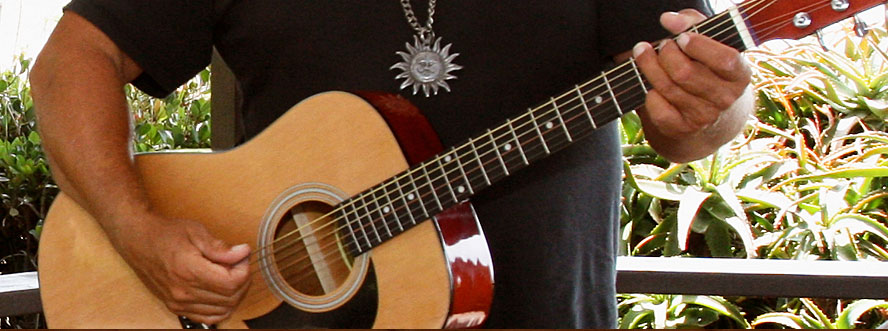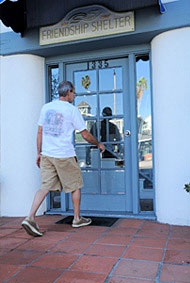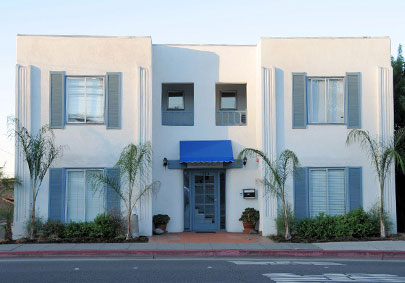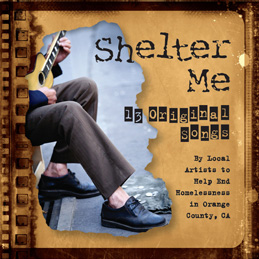
 |
 |


 |
 |
 |
 |
 |
 |
 |





A Little Help From My Friends
By Cindy Hale, Laguna Beach Magazine
The Friendship Shelter in Laguna Beach is a successful example of the power of helping hands.
 “It takes a village to save a life.” That’s the philosophy dished out by Randy Kraft, director of development for Friendship Shelter, the only comprehensive, year-round shelter open to the estimated 35,000 homeless of Orange County. Operating out of a residential hotel originally erected in 1938, the crisply renovated building sits near the beachfront of Laguna and serves approximately 220 homeless adults annually. Since its inception 20 years ago, the nonprofit Friendship Shelter has been a haven of hope as it offers a unique, multi-faceted approach to solving the problem of homelessness.
“It takes a village to save a life.” That’s the philosophy dished out by Randy Kraft, director of development for Friendship Shelter, the only comprehensive, year-round shelter open to the estimated 35,000 homeless of Orange County. Operating out of a residential hotel originally erected in 1938, the crisply renovated building sits near the beachfront of Laguna and serves approximately 220 homeless adults annually. Since its inception 20 years ago, the nonprofit Friendship Shelter has been a haven of hope as it offers a unique, multi-faceted approach to solving the problem of homelessness.
Helping Hands
Father Colin Henderson is a well-known, longtime resident of Laguna Beach. The Episcopal priest dedicated his life to serving those most in need, and one of the ways he fulfilled his calling was leading a group of Laguna Beach residents in their quest to establish a homeless shelter in 1987. Two decades later the Friendship Shelter has helped more than 5,000 homeless adults discover a path to a new life. Lest there be any confusion, however, Friendship Shelter is not representative of the traditional shelter that provides the typical two “hots” and a cot.
“We do provide housing and all the meals,” Randy says, “but we also help people move beyond the causes of their homelessness.”
 That leads to another distinction Randy likes to make clear: Friendship Shelter does not draw street people to Laguna Beach. “It’s not a handout that we’re offering, but an opportunity to move back into being a productive member of the community. We don’t define ourselves as a treatment center or a sober living facility. Our mission is to help people rebuild their lives.”
That leads to another distinction Randy likes to make clear: Friendship Shelter does not draw street people to Laguna Beach. “It’s not a handout that we’re offering, but an opportunity to move back into being a productive member of the community. We don’t define ourselves as a treatment center or a sober living facility. Our mission is to help people rebuild their lives.”
Currently there is a month long waiting list for a slot at the Friendship Shelter, and placements are reserved only for unaccompanied adults.
“Prospective residents are referred to us by a network of social services including churches, hospitals and mental health agencies,” Randy explains. “First they have to call us for a phone interview. If they are accepted and placed on the waiting list, they then have to check in daily with a phone call to see if there’s an opening. This forces them to demonstrate their level of commitment. How badly do they want this?”
 Once there’s an opening, potential residents must prove their sobriety by passing a drug screening, which means that they cannot have used alcohol or illegal drugs for at least the previous 10 days. Neither can they have any current outstanding arrest warrants. Acceptance to Friendship Shelter opens the doors to two programs. First is the Self-Sufficiency Program, which operates from a building on South Coast Highway in Laguna Beach. There is room for 31 adults at a time, and during their stay they are expected to work, save 80 percent of their wages, do chores, and actively participate in activities such as counseling, life skills training and AA meetings in order to rebuild their lives.
Once there’s an opening, potential residents must prove their sobriety by passing a drug screening, which means that they cannot have used alcohol or illegal drugs for at least the previous 10 days. Neither can they have any current outstanding arrest warrants. Acceptance to Friendship Shelter opens the doors to two programs. First is the Self-Sufficiency Program, which operates from a building on South Coast Highway in Laguna Beach. There is room for 31 adults at a time, and during their stay they are expected to work, save 80 percent of their wages, do chores, and actively participate in activities such as counseling, life skills training and AA meetings in order to rebuild their lives.
Graduates of the self-sufficiency program can then apply to live for up to one year at Henderson House, located in San Clemente. The furnished apartments are home to 25 adults who pay a modest amount of rent so that they can continue to save money in order to afford independent housing. During their time at Henderson House, they are still required to maintain sobriety as they continue to receive supportive services.
According to Mark Miller, director of programs, one of the most distinctive features of Friendship Shelter is that “within 48 hours residents are assigned a case manager. The case manager’s role is to identify the barriers that prevent that person from living an independent, self-sufficient life. And then they work with that person to form a systematic plan that will eliminate those barriers one by one.” Part of this plan is to assist the resident in finding a job.
Some of the case managers are among Friendship Shelter’s paid staff of 17 employees, and others are volunteers. In fact, the facility could not function without what Randy refers to as “an army of volunteers. They contribute about 10,000 hours of service each year. We have 300 of them, mostly from Laguna Beach. They cook, they bring bag lunches to the residents, they answer phones, and they provide their services to upgrade the facility.”

Laguna’s Benevolence
Some might think it surprising that the shelter could co-exist within the exclusive enclave of Laguna, but Randy dismisses that notion. “Laguna Beach, despite its growth and changes over the years, still has a sense of caring for those in need. It stays true to its history of compassion and activism,” she says.
Indeed, a full two-thirds of the financial support for Friendship Shelter comes from private donations, largely from members of the Laguna Beach community. Two annual fundraisers provide fun-filled opportunities to contribute. One is The Art of Getting Home, an auction of works donated by local artists held in September. Although 2008 was only the second offering of the event, it has proven to be both popular and successful. The other is Dinners Across Laguna and Beyond, where local homeowners host meals. Dates for the dinners vary, but they are generally offered late in the year. The price diners pay for their meals is a monetary donation to Friendship Shelter.
These fundraisers, along with informal presentations before various community groups, allow residents and recent graduates of Friendship Shelter to interact with private citizens. Such an experience helps to put a familiar face on the plight of the homeless.
“In the large community of homeless, it runs the gamut of different types of people, just as within any other population,” Mark explains. “But what we emphasize is that the segment of homeless people we work with have made a commitment to get their lives back on track. Our people,” he concludes, “still have hope.”
Tales of Two Lives Saved
Success at Friendship Shelter is measured by sustained sobriety, steady employment and the ability to maintain housing. More than 50 percent of residents graduate successfully from Friendship Shelter’s programs, although the facility’s long-range goals aim for a higher rate. The major impediments include the ever-present temptation of addiction and the uncertain availability of medical and mental health care. Mark and Frances (whose last names we chose to omit) are two of Friendship Shelter’s success stories.
Mark, 48, grew up in the Midwest. “I came from a good home in Ohio. I worked, I earned money, I owned my own car.” But a chronic medical problem, lapsed health insurance and unemployment created a maelstrom of circumstances that left him on the streets.
“I did what I had to do to survive,” he says. That included selling drugs, which earned him an eight-month prison sentence. “After that, once any employer did a background check, I was finished.”
Yet he didn’t give up in his quest to regain a semblance of his former life. “The biggest misconception people have about the homeless is that they’re homeless by choice. All I needed was someone willing to give me a second chance.”
Mark found that at Friendship Shelter. Currently living at Henderson House, he takes the Metrolink from San Clemente to Irvine, where he constructs exhibits for trade shows. It’s a job that allows him to use the woodworking skills he honed as a youngster back in Ohio.
Mark credits his case manager for acting as both cheerleader and tough-love counselor. “She told me what I needed to do, step-by-step, and made it clear that I needed to listen to someone else for a change. And sure enough,” he says, “once I decided to listen to her, everything just fell into place.”
Frances, 37, is a native of Southern California. But she became estranged from her family, lost her job and then lost custody of her son. “It was primarily financial problems that led me to becoming homeless,” she says. “Through word of mouth I heard about Friendship Shelter. It was the first place where I got the sense that the staff sincerely wanted me to be successful. Instead of looking down on me, they were compassionate.”
Frances cites the ability to save money as the biggest benefit of Friendship Shelter. That, and the job skills training helped her move beyond life on the streets. She recently moved from Henderson House to her own place in San Diego, where she has steady employment. She also regained custody of her 11-year-old son.
“The people in the community, especially in the neighborhood around the shelter and near Henderson House, would always smile and hold a good conversation with me. That’s nice, because so many people always think that a homeless person is looking for a handout,” Frances says. “And all I wanted was a helping hand.”
Charity Rocks!
It’s not uncommon to encounter a street musician in Laguna Beach. But when Scott Hays, a writer and local resident, crossed paths with a homeless guitar player and singer named David Holland, he realized he’d encountered a particularly gifted artist. The two struck up a friendship, and Scott decided he had to do something to help both David and others like him. He contacted Orange County singers and songwriters who donated their time and original music for “Shelter Me,” a compilation CD. The collaborative effort was produced as a charitable fundraiser for Friendship Shelter.
An anthology of musical genres including rock and blues, each of the songs on “Shelter Me” share a common theme: the world seen through the eyes of a wayward soul. Yet rather than evoking a mood of desperation, the songs are remarkably hopeful, if not insightful. After all, many artists who are currently working professionals are often just a couple of paychecks away from living on the streets.
To sample some tracks from “Shelter Me” visit Friendship Shelter’s website at friendshipshelter.org. You can also purchase the CD through the website or online at cdbaby.com. Several Laguna Beach shops offer the CD for sale as well.
Click here to view article from the Laguna Beach Magazine




Copyright © 2014 by Scott Hays. All Rights Reserved. Powered by GraphicState.